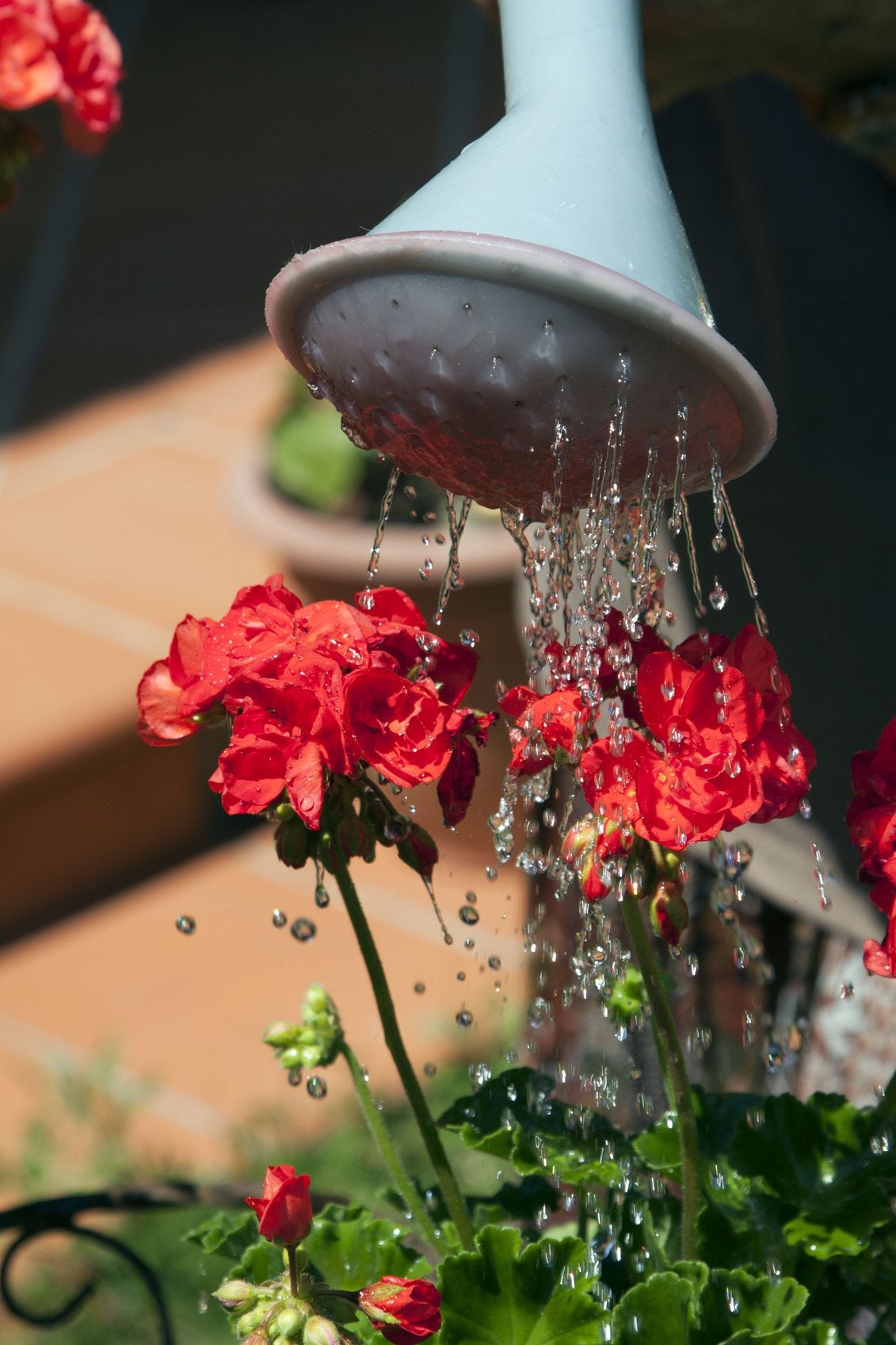Container Plant Watering: How Much And How Often To Water Potted Plants


It is often difficult to gauge how much water for container garden plants is necessary. There is a fine line between drought and soggy soil, and either one can be detrimental to plant health. Summer is the most difficult time for container plant watering. Some tips and hints can help the gardener determine when to water container plants. Tools like moisture gauges are helpful for ascertaining how much water for container garden plants is the healthy amount.
When to Water Container Plants
Potted plants tend to dry out more quickly than their in-ground counterparts. The small soil space and the construction of the pot mean the container stores very little moisture. In general, early morning or early evening is the optimal time to water your containers, as this will give the plant some time to take up the water before the heat of the day kicks in, but it will also allow excess water on the plant to evaporate quickly so that the plant is not vulnerable to fungus. It is also obviously time to water when the soil is dry all the way to the bottom, but this may be too late for the plant. Look for shriveled leaves, limp stems, dropping petals, and dry, discolored leaves. You should check potted plants daily in warm, dry conditions. Usually when the first inch (2.5 cm.) or so of soil is dry, it's a good indication that watering is needed. In summer, watering outdoor potted plants is necessary daily (and even twice a day) for most species, especially when temperatures reach over 85 degrees F. (29 C.).
How Often to Water Potted Plants
If you are consistently checking the pots, you will know when to water the plant. The frequency depends upon the species. Succulents and drought tolerant plants need to be watered less often than annuals and vegetables. Well-established plants can go longer before water than newly installed plants. It is best on most plants to water deeply and slowly, so water can access all parts of the soil and roots. Short, light watering just goes out the drainage holes before the plant can acquire the moisture or the soil can absorb the water. In fact, most potting soils can start to repel water if allowed to completely dry out. Slow and deep watering will not only ensure the water gets to the roots of the plant, but will also force over dry potting soil to absorb water again. If you have accidentally allowed the soil in your container to dry out completely, it would be wise to soak the entire container in a tub of water for a half hour or so in order to force rehydration of the potting soil. Container plant watering on baskets and coir or moss lined wire cages works best if you dunk the entire container in a bucket of water and let it soak.
How Much Water for Container Plants
The amount of water may vary from species to species. Find out the average moisture needs of your particular plant and then get a moisture gauge. These are very useful tools for container plant watering. The gauge has a probe that you stick into the soil and gives you a reading that rates the soil moisture level. If your plant needs moderately moist soil and the gauge reads in the drier zones, it is time to water. If you practice slow deep irrigation, water until the moisture leaches from the drainage holes. Let the top few inches (8 cm.) of soil dry out before watering again. Knowing how much water for container plants is appropriate is usually a matter of trial and error until you know your particular plant's preferences.
Tips for Watering Outdoor Potted Plants
Container plants outdoors need more water than those indoors. This is because higher temperatures, direct sunlight, and wind dry the soil quickly. These tips will make watering your potted plants easier:
- Use glazed pots to help prevent evaporation or place clay pots in another container.
- Apply a layer of mulch or rocks to the soil surface to slow moisture loss.
- Set up a drip irrigation system for watering outdoor potted plants. This allows for slow, even watering that the soil can absorb before it all runs through the pot and out the drainage holes.
- Apply water in early morning or late evening when temperatures are cooler and direct sun will not cook off the moisture before it can seep down to the roots.
Gardening tips, videos, info and more delivered right to your inbox!
Sign up for the Gardening Know How newsletter today and receive a free copy of our e-book "How to Grow Delicious Tomatoes".

Bonnie Grant is a professional landscaper with a Certification in Urban Gardening. She has been gardening and writing for 15 years. A former professional chef, she has a passion for edible landscaping.
-
 Looking For Plants To Give You The Soft And Fuzzies? Try These 5 Fuzzy Leaf Plant Options
Looking For Plants To Give You The Soft And Fuzzies? Try These 5 Fuzzy Leaf Plant OptionsLovers of texture, drama, silver foliage and tactile plants will adore these special sensory garden additions. These fuzzy leaf plant options will leave you all aglow
By Susan Albert
-
 Get Ready For A Summer Of Hummers! Grow These Full Sun Hummingbird Plants and Flowers
Get Ready For A Summer Of Hummers! Grow These Full Sun Hummingbird Plants and FlowersIf you’re lucky enough to enjoy a sunny backyard, make sure you are maxing out on your pollinator opportunities and grow these full sun hummingbird plants and flowers
By Tonya Barnett